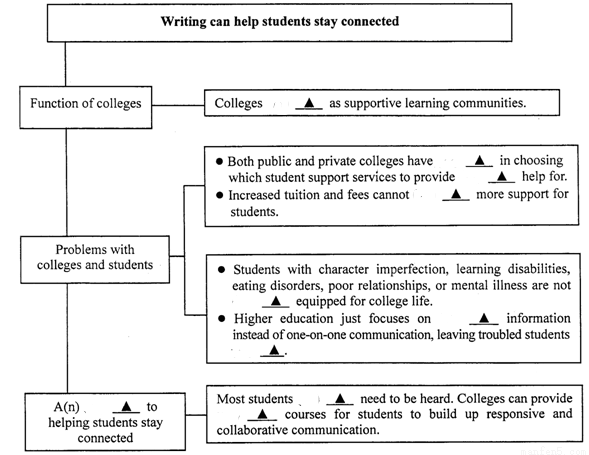题目内容
Most interviewees are probably aware that interviewers are not supposed to ask them certain questions. There are some areas of special in selection interviewing. Our goal here is to point out these areas of questions and to suggest strategic ways to them as an interviewee.
Courts have that it's none of the company's business how many children an applicant has; or whether he or she is married, or divorced. In this area, if you are asked an illegal question, you can give a general ; saying elegantly: "I would prefer to stick to job-related questions:" Or you can be more : "Are children a requirement for this position?"
, many instances of illegal interview questions occur in' the course -of getting-to-know-you small talk during an interview and aren't by the interviewer as an invasion(侵犯)of your privacy. But innocent or not, illegal interview questions can a company in court when a job seeker discrimination in the interview process.
To age discrimination in hiring, courts have disallowed these sorts of questions: "How old are you?" "When did you graduate from high school?" and so on. Managers get in trouble here when they talk about the average age of their workforce in to -the candidate: "Our typical employee is probably 8 to 10 years older than you. Do you expect problems managing people older than yourself?" You can imagine the later court . Manager: "But, Your Honor, I never asked her age!”Candidate: "My age seemed to be one of his key about my ability to manage." And, of course, you can avoid all these disputes(争执)by simply answering your employer: "Age has been a consideration for me in my work life."
In another area of sex, an employer cannot ask questions about the person's gender(性别) the job specifications strictly require either a male or a female. The burden of proof is on the to demonstrate(论证)that only a man or a woman can do the job. Employers should be cautious: Courts and the Equal Employment Opportunity Commission have interpreted very the concept that only one gender can perform a particular job.
1.A. stability B.sensitivity C. possibility D. responsibility
2.A. illegal B. complex C. absurd D. realistic
3.A. prepare B. challenge C. ask D. handle
4.A. ruled B. proposed C. guided D. explained
5.A. separate B. lonely C. single D. individual
6.A. consideration B.introduction C. summary D. response
7.A. vague B. pointed C. polite D. aggressive
8.A.In particular B.In detail C. In addition D. In truth
9.A. ordinary B. formal C. serious D. important
10.A. settled B. illustrated C. intended D. charged
11.A. land B. cause C. help D. find
12.A. requires B. permits C. avoids D. claims
13.A: support B. evaluate C. prevent D. discover
14.A. reaction B.relation C. comparison D. contrast
15.A. atmosphere B. scene C. result D. decision
16.A. qualities B. elements C. concerns D. problems
17.A. always B. never C. ever D. often
18.A. until B. unless C. once D. before
19.A. employee B. committee C. court D. employer
20.A. narrowly B. broadly C. wrongly D. correctly
1.B
2.A
3.D
4.A
5.C
6.D
7.B
8.D
9.A
10.C
11.A
12.D
13.C
14.B
15.B
16.C
17.B
18.B
19.D
20.A
【解析】
试题分析:工作面试中经常会遇到一些敏感的话题,这些都是非法的领域,文章介绍了一些方法,如果遇到这些问题应该怎么应付。
1.
2.
3.
4.
5.
6.
7.
8.
9.
10.
11.
12.
13.
14.
15.
16.
17.
18.
19.
20.
考点:考查日常生活类完型填空

 名校名师培优作业本加核心试卷系列答案
名校名师培优作业本加核心试卷系列答案 全程金卷系列答案
全程金卷系列答案 with 3.9% for those with a bachelor’s degree or more education. The difference is even bigger among those aged 16-24. The jobless rate for those with only a high school diploma in that age group is about 20%. At the same time, recent research by Canadian economists cautions that a college degree is no guarantee of promising employment.
with 3.9% for those with a bachelor’s degree or more education. The difference is even bigger among those aged 16-24. The jobless rate for those with only a high school diploma in that age group is about 20%. At the same time, recent research by Canadian economists cautions that a college degree is no guarantee of promising employment.